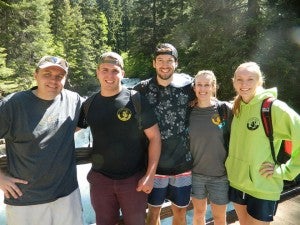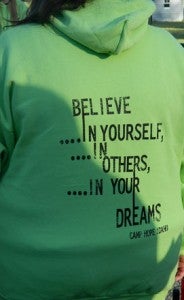
Camp HOPE Idaho was based at Trinity Pines, near Cascade Idaho. Campers were recruited out of the Nampa Family Justice Center through the center’s connections with counselors and local domestic violence shelters throughout the Treasure Valley. Sixteen campers, ages 10-13, were able to participate in many activities seen in most residential summer camps, such as hiking, swimming, rafting on the Payette river, ropes courses and zip line activities. Additionally, Camp HOPE offers many specialized group and individual therapeutic activities for campers to help them cope with issues seen in this population.

Camp HOPE has been in existence for 11 years, exclusively in California. From 2003-2011, Camp HOPE operated as a program of the San Diego Family Justice Center. In 2012, the Shasta Family Justice Center in Redding, Calif., with support from the National Family Justice Center Alliance, engaged a broad cross-section of supporters from the community to host a powerful weeklong camping program for Shasta Family Justice Center children and at-risk children connected to allied agencies of the center.
Upon its success the alliance began developing a more comprehensive Camp HOPE camping initiative for Family Justice Centers across the country as well as strengthening the camps in California. The vision for Camp HOPE is to break the generational cycle of family violence by offering healing and hope to children who are victims of family violence and giving them the opportunity to build relationships with other children with similar experiences. It also provides them with a safe, fun and engaging camping experience.
In 2013, the Boise State School of Nursing was part of a group that was able to send children from the Nampa/Caldwell area to northern California. With the support of the Family Justice Center Foundation of Idaho, several entities worked over the past year to put on Camp HOPE Idaho. This made Idaho the first state outside of California to hold this camp. In addition to the School of Nursing and the Nampa Family Justice Center, the St Luke’s Children’s Hospital and the medical director of the CARES program, Dr. Paul McPherson, MD, Idaho’s only Child Abuse Specialist, were part of Camp HOPE Idaho. Dr. McPherson attended Camp HOPE Idaho and was part of the strong medical team present for the activities involved.
According to the National Center for Children Exposed to Violence, childhood exposure to violence has a devastating impact on children’s development, affecting emotional growth, cognitive development, physical health and school performance. Exposure to violence at a young age has been significantly linked with increased depression, anxiety, anger, and alcohol and drug abuse, and with decreased academic achievement. Children who experience violence either as victims or as witnesses are at increased risk of becoming violent themselves. These children are significantly more likely to have involvement with the juvenile justice system, committing crimes at younger ages and nearly twice as often as their peers who have not been similarly exposed to violence.
For more information about the Nampa Family Justice Center, visit nampafamilyjusticecenter.org. For more information about the National Family Justice Center Alliance, visit familyjusticecenter.org.